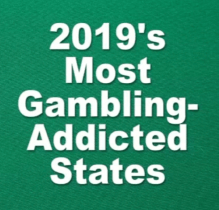Which states of US are most gambling addicted

Two decades ago, gambling was allowed only in two states of the United States, and in the other 48 states are prohibited by law. Now the situation has changed by 180 degrees: in 48 states in one form or another, gambling (cards, betting, slot machines, lottery etc.) allowed, and only in two states (Hawaii and Utah) gambling is prohibited completely.
In a number of states, gambling has learned to circumvent legal obstacles. For example, the laws of the states of Illinois, Missouri, Louisiana and Iowa prohibit gambling on state land. The ban was delicately bypassed - huge barges were used as casinos, formally located in the water, and not on the ground.
Eight out of ten Americans believe that there is nothing wrong with a casino and they should be completely legitimized. In 1998, residents of the United States spent approximately $50 billion on bets - more than they spent on buying music, going to cinemas, stadiums and recreation parks.
More than 60% of Americans in 2001 played for money. For twenty years, the bets of Americans grew by 2,800% - from $17 billion to $482 billion spent. According to 1996 data (calculations were made by Professor Nelson Rose) 2.5 million Americans have a pathological passion for the casino games. 3 million have serious psychological problems in this regard. Another 15 million people are at risk of gambling addiction. Thus, approximately every tenth adult resident of the United States is in psychological dependence in regards of gambling. As a result of a study conducted by the University of Illinois, it became known that more than half of casino and lottery income come from people with similar psychological problems.

Gambling brings more income than the film industry, the organization of sports shows, the sale of music recordings and tickets for cruises combined. During the year, US casinos earn about $70 billion. According to the North American Lottery Association, lottery tickets sales were nearly $39 billion in 2001 — so, in average, every American, including babies and deep old men, spent on the purchase of lottery tickets $157 during that year.
According to the Center for Responsive Politics, in 2001 the gambling business spent more than $7 million on lobbying its interests, in 2000 - more than $11 million. The gambling industry is able to pay back investments in the shortest time. For example, in 1978, Atlantic City became the second (after Las Vegas) city in the United States where casinos were allowed. The cost of building and launching the first International Resorts with casino was just over $45 million. Already in 1996, the annual turnover of this casino was almost $225 million.
The gambling industry has turned Las Vegas, founded by the Mafia and built in the middle of the desert, into the fastest growing city in the United States. The gaming industry has made it possible to incredibly develop the hotel business in Las Vegas as well. New York remains one of the world's largest tourist centers for several decades. However, New York is almost twice as low as Las Vegas in the number of hotel rooms. A nationwide survey by the United States Tourism Association showed that 38% of Americans have visited Las Vegas at least once. On average, each visitor to the capital of US gambling spends 4 days there. In 1996, Las Vegas received a record number of guests - 29.6 million. Nine out of ten tourists played casino games. On average, each player spent 4 hours in the casino and spent more than $580 on the casino game bets. As a result, the state of Nevada, in whose territory Las Vegas is located, constantly occupies 5-6 places among the states of the USA, where tourists leave large amount of money. It should be noted that in Nevada there are practically no attractions that may be of interest to tourists. Indian reservations were granted the right to create casinos in 1998. Already in 2001, the Indians earned $12.7 billion from gambling enthusiasts - only gambling houses in Las Vegas ahead of Indian tribes. Out of 562 Indian tribes, 201 staged casino reservations.

However, there is a big fly in the ointment. In countries where casinos operate, the crime rate is about 8% higher than in countries where gambling is prohibited by law. Since the start of gambling in Atlantic City, the number of crimes in this city has doubled. In areas where casinos are open, approximately 80% more crimes are committed than the national average. If in the United States as a whole, the crime rate in recent years has been decreasing, in the centers of gambling business, crime, on the contrary, is growing. In addition, the casino is not the best way to influence local business. In the US, there is a clear pattern: if gambling houses open in the city, then this is followed by massive bankruptcy of small businesses (cafes, restaurants, shops, real estate agencies, etc.). The US states, among whose population the highest percentage of gamblers, lead in the number of bankruptcies.